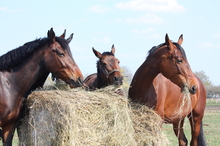As of 3/5/2013, the Utah State Veterinarian has confirmed eight cases of Equine Herpes Virus (EHV-1) in Utah, all of which are confined to locations in Cache County. The State Veterinarian's Office is restricting the movement of the animals at eight locations in Cache County as a precaution to prevent the spread of the disease.

Equine herpes virus - Contagious in horses
Utah horse owners are advised to take extra biosecurity precautions when taking their animals to shows or public arenas because of the eight cases of EHV-1 confirmed in Cache Valley.
The outbreak remains confined to Cache County, as there have been no other reports of EHV-1 symptoms in horses in other areas of the state. Nonetheless, horse owners throughout Utah are advised to take extra biosecurity precautions when taking their animals to shows or public arenas.
Two of the eight horses have been humanely euthanized because of their condition. The remaining animals are being treated, and are under veterinary care. The Cache County Fairgrounds Horse Arena has closed its riding arena until further notice because all of the horses had been at the facility recently.
Horse owners who have taken their animals to the Cache County Fairgrounds Arena during the past 30 days should monitor their horse's temperature and report concerns to their local veterinarian.
The State Veterinarian recommends that horse facilities proceed with planned equine events, and that horse owners planning on traveling to an event should take their horse's temperature daily, beginning three days prior to travel and daily during the event.
Horses with temperatures of 103 and above should not travel or mingle with other horses. Horses should be isolated for two weeks after returning home from an event, during which time they should be monitored for disease symptoms.
EHV-1 is not transmissible to people.
EHV-1 can affect a horse's reproductive, respiratory and nervous systems and can lead to death.
This highly contagious disease can spread rapidly among horses through the air, nose-to-nose contact, contaminated equipment, clothing, and human hands.
Statewide, no other horses have shown signs of EHV-1. Utah horse owners are advised to take extra security measures to prevent unnecessary contact with possibly infected horses, and to quickly report symptoms to their veterinarian.
Horse event coordinators should contact their show veterinarian for recommendations concerning planned events.
"As a precaution to Utah horse owners, I advise they take extra biosecurity steps to safeguard the health of their animals, said State Veterinarian, Dr. Bruce King. "Don't let your horses touch other horses, especially nose to nose. Isolate horses that return to the farm from a show or event," added Dr. King.
Equine Herpes Virus symptoms include fever, decreased coordination, nasal discharge, urine dribbling, loss of tail tone, hind limb weakness, leaning against a wall or fence to maintain balance, lethargy, and the inability to rise. While there is no cure, the symptoms of the disease may be treatable. Horse owners should watch their horses carefully and call their veterinarian immediately if any abnormal signs are observed.
An expanded list of biosecurity tips is available at: USDA-APHIS Biosecurity
Learn more about EHV-1 in Horses
